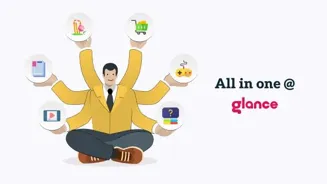Unlock peak productivity by dispelling common myths. Learn how to work smarter, not harder. Read more to unleash your potential
In the bustling landscape of today's professional world, everyone is chasing
that elusive goal: productivity. We're constantly bombarded with tips, tricks, and hacks promising to unlock our maximum potential.
But amidst all the noise, it's easy to fall prey to misconceptions that actually hinder our progress. These myths, often disguised as productivity boosters, can lead to burnout, inefficiency, and ultimately, a failure to achieve our goals.
Let's ditch the outdated notions and explore seven common productivity myths that might be holding you back from truly thriving.
Myth number one
Multitasking is the key to getting more done. Ah, multitasking! The siren song of the modern workforce. We proudly juggle multiple tasks simultaneously, feeling like productivity ninjas. But neuroscience tells a different story.
Our brains aren't wired for true multitasking; instead, we're rapidly switching between tasks. This constant switching incurs a cognitive cost, leading to decreased focus, increased errors, and ultimately, more time spent on each task.
Think of it like this: Instead of pouring water into three glasses at once (and likely spilling some), focus on filling one glass completely before moving on to the next. You'll be surprised at how much faster and cleaner the process becomes.
Embrace the power of single-tasking, where you dedicate your full attention to one task at a time. Close those unnecessary tabs, silence notifications, and immerse yourself in the present moment.
You'll not only produce higher-quality work but also experience a sense of accomplishment as you complete each task with focused intention. This conscious shift towards single-tasking is the best way to achieve peak productivity.
Myth number two
Working longer hours equals greater output. This one is a doozy. We've been conditioned to believe that success is directly proportional to the number of hours we clock in. The "hustle" culture glorifies grueling schedules and encourages us to push ourselves to the brink of exhaustion.
But science reveals a different reality: Working excessive hours leads to diminishing returns. After a certain point, our cognitive abilities decline, focus wanes, and we become prone to errors. Burnout looms large, draining our motivation and passion.
It's like trying to squeeze water from a stone – you might get a few drops, but you'll expend a lot of energy in the process. Instead of prioritizing quantity, focus on quality. Work smarter, not harder. Take regular breaks to recharge your mind and body.
Studies have shown that short breaks throughout the day can significantly improve focus and productivity. Step away from your screen, stretch, take a walk, or simply close your eyes and breathe deeply.
Experiment with time management techniques like the Pomodoro Technique, which involves working in focused bursts followed by short breaks.
Myth number three
Saying "yes" to everything is essential for success. Many of us equate saying "yes" to every request with being a team player or demonstrating our capabilities. We fear missing out on opportunities or disappointing others. But continually overcommitting yourself is a recipe for disaster.
You become stretched thin, unable to dedicate the necessary attention and energy to each task. Your quality of work suffers, and your stress levels skyrocket. The art of saying "no" is a powerful tool for protecting your time and energy.
It allows you to prioritize tasks that align with your goals and values. Saying "no" doesn't make you selfish; it makes you strategic. It shows that you value your time and are committed to delivering quality work.
When faced with a request, take a moment to assess its importance and relevance to your goals. If it doesn't align with your priorities or if you're already overloaded, politely decline. Offer alternative solutions or suggestions if possible.
Remember, saying "no" to unimportant tasks allows you to say "yes" to opportunities that truly matter.
Myth number four
Perfectionism is the path to excellence. Striving for excellence is admirable, but when it morphs into perfectionism, it can become a major productivity killer. Perfectionists get bogged down in the details, endlessly tweaking and refining their work until it's "just right.
" They fear making mistakes and are overly critical of themselves. This can lead to analysis paralysis, procrastination, and a general sense of dissatisfaction. Understand this, perfectionism is a flawed mindset that stifles creativity and prevents you from completing tasks efficiently.
Embrace imperfections! Don't let the pursuit of perfection hold you back from launching that project, submitting that report, or sharing your ideas. Adopt a growth mindset, viewing mistakes as learning opportunities rather than failures. Focus on progress, not perfection.
Set realistic goals and deadlines. Celebrate your accomplishments, no matter how small. Remember, done is better than perfect. By accepting imperfections and focusing on continuous improvement, you'll unlock your true potential and achieve greater productivity.
Myth number five
All breaks are equally beneficial. We all know that taking breaks is important for productivity. But not all breaks are created equal. Mindlessly scrolling through social media or engaging in passive activities can actually leave you feeling more drained and distracted.

The key is to choose breaks that actively recharge your mind and body. Step away from your screens and engage in activities that promote relaxation, mindfulness, and creativity. Take a walk in nature, practice deep breathing exercises, listen to music, or engage in a hobby you enjoy.
Short, focused breaks throughout the day are more effective than long, unproductive ones. Experiment with different types of breaks to find what works best for you. The goal is to return to your work feeling refreshed, energized, and ready to tackle the next challenge.
So next time you feel the need for a break, be mindful of how you spend that time. Choose activities that truly nourish your mind and body, and watch your productivity soar.
Myth number six
Routine is the enemy of creativity. While spontaneity and flexibility are important, dismissing the value of routine entirely is a mistake. A well-structured routine can actually enhance productivity by reducing decision fatigue and creating a sense of flow.

When you establish consistent habits, you free up mental energy that can be used for more creative and strategic thinking. Think of it like this: A routine provides the framework upon which you can build your day.
It helps you prioritize tasks, manage your time effectively, and stay focused on your goals. However, it's important to strike a balance between routine and flexibility. Rigidly adhering to a strict schedule can stifle creativity and lead to burnout.
Allow for some spontaneity and flexibility in your routine, and be willing to adjust it as needed. Experiment with different routines to find what works best for you. The goal is to create a structure that supports your productivity and creativity, without feeling restrictive or overwhelming.













